英美文化差异
大学易考知识点英美文化差异
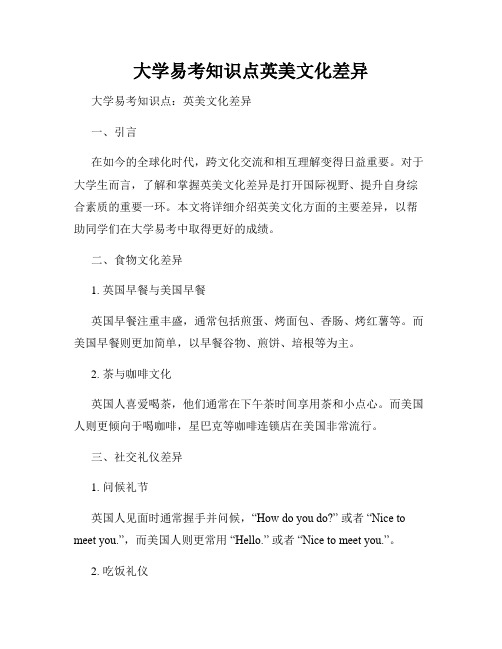
大学易考知识点英美文化差异大学易考知识点:英美文化差异一、引言在如今的全球化时代,跨文化交流和相互理解变得日益重要。
对于大学生而言,了解和掌握英美文化差异是打开国际视野、提升自身综合素质的重要一环。
本文将详细介绍英美文化方面的主要差异,以帮助同学们在大学易考中取得更好的成绩。
二、食物文化差异1. 英国早餐与美国早餐英国早餐注重丰盛,通常包括煎蛋、烤面包、香肠、烤红薯等。
而美国早餐则更加简单,以早餐谷物、煎饼、培根等为主。
2. 茶与咖啡文化英国人喜爱喝茶,他们通常在下午茶时间享用茶和小点心。
而美国人则更倾向于喝咖啡,星巴克等咖啡连锁店在美国非常流行。
三、社交礼仪差异1. 问候礼节英国人见面时通常握手并问候,“How do you do?” 或者“Nice to meet you.”,而美国人则更常用“Hello.” 或者“Nice to meet you.”。
2. 吃饭礼仪在英国,吃饭时需要将叉子握在左手上,将刀握在右手上。
而在美国,刀切食物时通常使用右手。
四、教育体系差异1. 大学制度英国大学通常采用三年制本科课程,专业选择在入学时就要确定。
而美国大学的本科通常需要四年,学生在前两年可以尝试不同的课程,再确定自己的专业。
2. 教学方式英国教育注重理论学习,学生的学习重点是独立思考和批判性思维。
而美国教育更注重实践与实际应用,学生有更多的项目和实践机会。
五、假期与节日差异1. 假期名称英国人称圣诞节为 "Christmas",而美国人则称之为 "Xmas"。
2. 礼品交换英国人在圣诞节通常交换礼物时将其放在树下,而美国人则把礼物放在袜子里,挂在壁炉上。
六、体育文化差异1. 足球与美式橄榄球英国人酷爱足球,这是他们最受欢迎的运动项目之一。
而美国人则更喜欢橄榄球,尤其是在大学校园内。
2. 棒球与板球美国人喜欢棒球,而英国人则推崇板球,两者虽然相似但规则和比赛方式略有不同。
谈谈英国文化与美国文化的异同
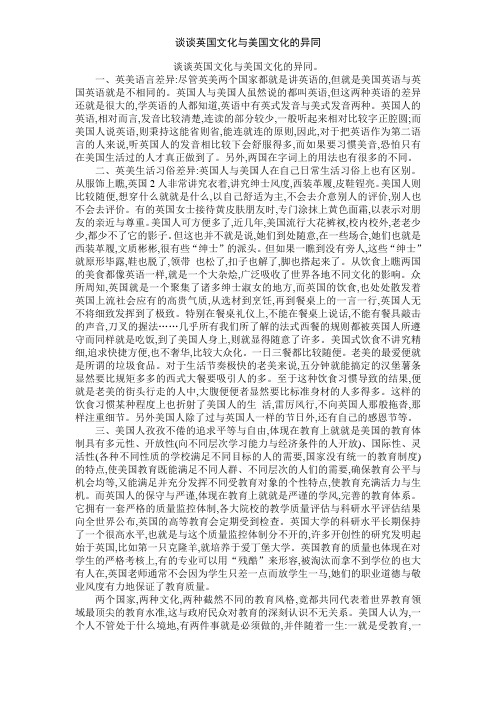
谈谈英国文化与美国文化的异同。
一、英美语言差异:尽管英美两个国家都就是讲英语的,但就是美国英语与英国英语就是不相同的。
英国人与美国人虽然说的都叫英语,但这两种英语的差异还就是很大的,学英语的人都知道,英语中有英式发音与美式发音两种。
英国人的英语,相对而言,发音比较清楚,连读的部分较少,一般听起来相对比较字正腔圆;而美国人说英语,则秉持这能省则省,能连就连的原则,因此,对于把英语作为第二语言的人来说,听英国人的发音相比较下会舒服得多,而如果要习惯美音,恐怕只有在美国生活过的人才真正做到了。
另外,两国在字词上的用法也有很多的不同。
二、英美生活习俗差异:英国人与美国人在自己日常生活习俗上也有区别。
从服饰上瞧,英国2人非常讲究衣着,讲究绅士风度,西装革履,皮鞋锃亮。
美国人则比较随便,想穿什么就就是什么,以自己舒适为主,不会去介意别人的评价,别人也不会去评价。
有的英国女士接待黄皮肤朋友时,专门涂抹上黄色面霜,以表示对朋友的亲近与尊重。
美国人可方便多了,近几年,美国流行大花裤衩,校内校外,老老少少,都少不了它的影子。
但这也并不就是说,她们到处随意,在一些场合,她们也就是西装革履,文质彬彬,很有些“绅士”的派头。
但如果一瞧到没有旁人,这些“绅士”就原形毕露,鞋也脱了,领带也松了,扣子也解了,脚也搭起来了。
从饮食上瞧两国的美食都像英语一样,就是一个大杂烩,广泛吸收了世界各地不同文化的影响。
众所周知,英国就是一个聚集了诸多绅士淑女的地方,而英国的饮食,也处处散发着英国上流社会应有的高贵气质,从选材到烹饪,再到餐桌上的一言一行,英国人无不将细致发挥到了极致。
特别在餐桌礼仪上,不能在餐桌上说话,不能有餐具敲击的声音,刀叉的握法……几乎所有我们所了解的法式西餐的规则都被英国人所遵守而同样就是吃饭,到了美国人身上,则就显得随意了许多。
美国式饮食不讲究精细,追求快捷方便,也不奢华,比较大众化。
一日三餐都比较随便。
老美的最爱便就是所谓的垃圾食品。
英美文化差异
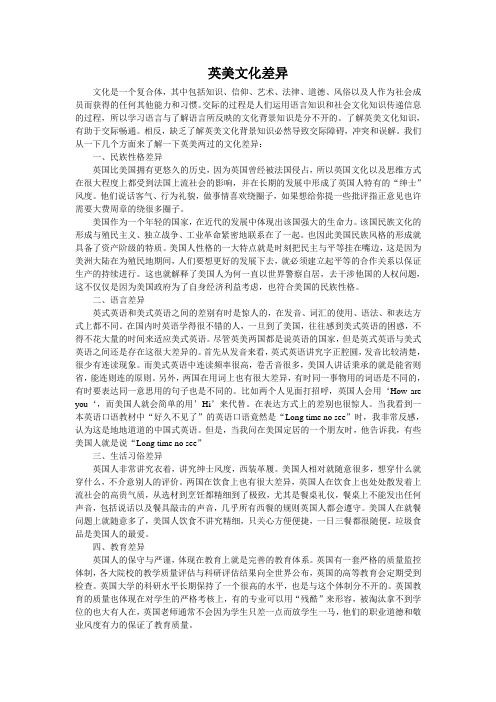
英美文化差异文化是一个复合体,其中包括知识、信仰、艺术、法律、道德、风俗以及人作为社会成员而获得的任何其他能力和习惯。
交际的过程是人们运用语言知识和社会文化知识传递信息的过程,所以学习语言与了解语言所反映的文化背景知识是分不开的。
了解英美文化知识,有助于交际畅通。
相反,缺乏了解英美文化背景知识必然导致交际障碍,冲突和误解。
我们从一下几个方面来了解一下英美两过的文化差异:一、民族性格差异英国比美国拥有更悠久的历史,因为英国曾经被法国侵占,所以英国文化以及思维方式在很大程度上都受到法国上流社会的影响,并在长期的发展中形成了英国人特有的“绅士”风度。
他们说话客气、行为礼貌,做事情喜欢绕圈子,如果想给你提一些批评指正意见也许需要大费周章的绕很多圈子。
美国作为一个年轻的国家,在近代的发展中体现出该国强大的生命力。
该国民族文化的形成与殖民主义、独立战争、工业革命紧密地联系在了一起。
也因此美国民族风格的形成就具备了资产阶级的特质。
美国人性格的一大特点就是时刻把民主与平等挂在嘴边,这是因为美洲大陆在为殖民地期间,人们要想更好的发展下去,就必须建立起平等的合作关系以保证生产的持续进行。
这也就解释了美国人为何一直以世界警察自居,去干涉他国的人权问题,这不仅仅是因为美国政府为了自身经济利益考虑,也符合美国的民族性格。
二、语言差异英式英语和美式英语之间的差别有时是惊人的,在发音、词汇的使用、语法、和表达方式上都不同。
在国内时英语学得很不错的人,一旦到了美国,往往感到美式英语的困惑,不得不花大量的时间来适应美式英语。
尽管英美两国都是说英语的国家,但是英式英语与美式英语之间还是存在这很大差异的。
首先从发音来看,英式英语讲究字正腔圆,发音比较清楚,很少有连读现象。
而美式英语中连读频率很高,卷舌音很多,美国人讲话秉承的就是能省则省,能连则连的原则。
另外,两国在用词上也有很大差异,有时同一事物用的词语是不同的,有时要表达同一意思用的句子也是不同的。
英美文化差异知识点总结
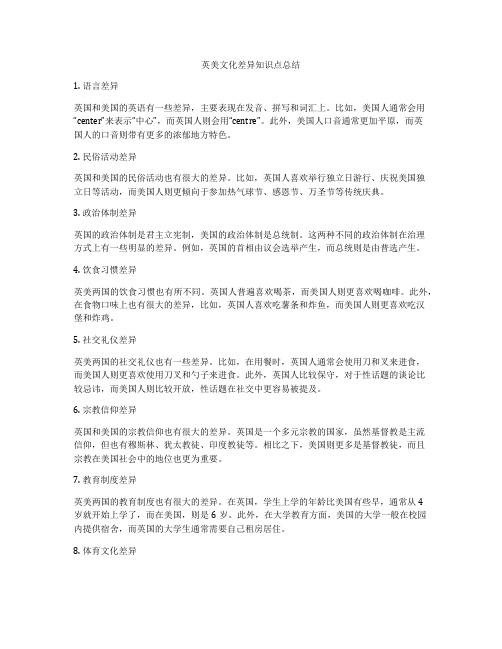
英美文化差异知识点总结1. 语言差异英国和美国的英语有一些差异,主要表现在发音、拼写和词汇上。
比如,美国人通常会用“center”来表示“中心”,而英国人则会用“centre”。
此外,美国人口音通常更加平原,而英国人的口音则带有更多的浓郁地方特色。
2. 民俗活动差异英国和美国的民俗活动也有很大的差异。
比如,英国人喜欢举行独立日游行、庆祝美国独立日等活动,而美国人则更倾向于参加热气球节、感恩节、万圣节等传统庆典。
3. 政治体制差异英国的政治体制是君主立宪制,美国的政治体制是总统制。
这两种不同的政治体制在治理方式上有一些明显的差异。
例如,英国的首相由议会选举产生,而总统则是由普选产生。
4. 饮食习惯差异英美两国的饮食习惯也有所不同。
英国人普遍喜欢喝茶,而美国人则更喜欢喝咖啡。
此外,在食物口味上也有很大的差异,比如,英国人喜欢吃薯条和炸鱼,而美国人则更喜欢吃汉堡和炸鸡。
5. 社交礼仪差异英美两国的社交礼仪也有一些差异。
比如,在用餐时,英国人通常会使用刀和叉来进食,而美国人则更喜欢使用刀叉和勺子来进食。
此外,英国人比较保守,对于性话题的谈论比较忌讳,而美国人则比较开放,性话题在社交中更容易被提及。
6. 宗教信仰差异英国和美国的宗教信仰也有很大的差异。
英国是一个多元宗教的国家,虽然基督教是主流信仰,但也有穆斯林、犹太教徒、印度教徒等。
相比之下,美国则更多是基督教徒,而且宗教在美国社会中的地位也更为重要。
7. 教育制度差异英美两国的教育制度也有很大的差异。
在英国,学生上学的年龄比美国有些早,通常从4岁就开始上学了,而在美国,则是6岁。
此外,在大学教育方面,美国的大学一般在校园内提供宿舍,而英国的大学生通常需要自己租房居住。
8. 体育文化差异英国和美国的体育文化也有很大的差异。
在英国,足球是最受欢迎的运动之一,而在美国,橄榄球、篮球、棒球等运动更受欢迎。
9. 性别平等观念差异英美两国的性别平等观念也有不同。
英国的性别平等观念相对较早形成,女性在政治、经济等方面的地位相对较高。
英美文化差异的解析和理解
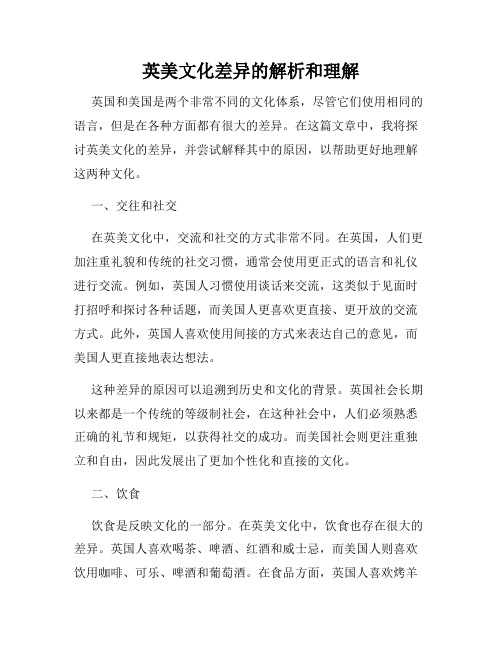
英美文化差异的解析和理解英国和美国是两个非常不同的文化体系,尽管它们使用相同的语言,但是在各种方面都有很大的差异。
在这篇文章中,我将探讨英美文化的差异,并尝试解释其中的原因,以帮助更好地理解这两种文化。
一、交往和社交在英美文化中,交流和社交的方式非常不同。
在英国,人们更加注重礼貌和传统的社交习惯,通常会使用更正式的语言和礼仪进行交流。
例如,英国人习惯使用谈话来交流,这类似于见面时打招呼和探讨各种话题,而美国人更喜欢更直接、更开放的交流方式。
此外,英国人喜欢使用间接的方式来表达自己的意见,而美国人更直接地表达想法。
这种差异的原因可以追溯到历史和文化的背景。
英国社会长期以来都是一个传统的等级制社会,在这种社会中,人们必须熟悉正确的礼节和规矩,以获得社交的成功。
而美国社会则更注重独立和自由,因此发展出了更加个性化和直接的文化。
二、饮食饮食是反映文化的一部分。
在英美文化中,饮食也存在很大的差异。
英国人喜欢喝茶、啤酒、红酒和威士忌,而美国人则喜欢饮用咖啡、可乐、啤酒和葡萄酒。
在食品方面,英国人喜欢烤羊肉、炖牛肉、鱼和薯条等传统菜肴,而美国人则更加偏爱汉堡包、烤肉、墨西哥风味和亚洲风味的菜肴。
这种差异的原因也与历史和文化有关。
在英国,社会中类似于乡村生活的传统非常强烈,这与英国农业历史有关。
英国人的饮食和文化更加传统和富有历史感。
而美国是一个大型移民国家,这导致了美国文化的多样性和变化,因此其饮食和文化也更加多样化。
三、教育教育也是英美文化的重要组成部分。
在英国教育系统中,学生通常会接受更传统和理论化的教育,教师对知识的纯粹性和理论性更加看重。
而在美国,教育则更加注重实践和应用技能。
美国的课程安排通常更加灵活,鼓励学生进行独立思考和创造性思考。
两个国家教育差异的原因与其文化和历史有关。
在英国,传统的上流社会通常会强调传统的教育方法,而美国则更注重个体自由和发展,鼓励学生发挥自己的创造性和才华。
因此,这两种教育体系反映了不同文化之间的信仰和价值观的差异。
专业的英美文化比较

专业的英美文化比较英美文化是广大学子们研究的热门话题之一。
作为两个英语国家,英美文化之间既有相似之处,又有明显的差异。
本文将从语言、饮食、礼仪、教育等多个方面比较英美文化的不同之处和共同特点。
一、语言差异英国英语和美国英语是世界上使用最广泛的两种英语分支。
尽管两者基本相通,但在发音、词汇和拼写等方面存在一些差异。
例如,英国英语中的“colour”在美国英语中是“color”,英国英语中的“centre”在美国英语中是“center”。
此外,口音也会有所不同,英国人通常有浓重的“Received Pronunciation”口音,而美国人则有地区特色口音,如波士顿口音和南部口音等。
二、饮食文化比较英美两国在饮食方面也存在一些差异。
英国人习惯于早餐吃燕麦片、炒鸡蛋和培根,而美国人更喜欢吃煎饼、炸薯条和炒蛋。
午餐方面,英国人常常享用炖肉和蔬菜,而美国人则偏爱汉堡和三明治。
晚餐方面,英国人通常吃肉、土豆和蔬菜,美国人则更喜欢肉排、烤鸡和玉米。
三、礼仪差异在社交礼仪方面,英美文化也有一些显著差异。
在英国,人们更加注重对待陌生人的礼貌,如排队、道歉和向陌生人问好等。
在美国,人们普遍更加开放和友善,可能会更频繁地使用亲昵的称呼,如“亲爱的”、“好兄弟”等。
此外,两国的商务礼仪也有所不同,英国商务场合更加正式,重视面子和传统,而美国商务场合更加务实和注重效率。
四、教育体制对比英美两国的教育体制也存在很多差异。
在英国,学生通常从年龄为4或5岁的幼儿园开始接受教育,然后进入小学、中学和大学。
英国大学一般以教授学院制度为主,注重学术研究。
而在美国,教育体系分为幼儿园、小学、初中、高中和大学等阶段。
美国大学则更加注重实践和职业培训,鼓励学生积极参与社会实践和实习。
综上所述,英美文化比较展现出的是一个多元而丰富的世界。
尽管英美两国有着共同的语言和历史背景,但在语言、饮食、礼仪和教育等方面仍然存在显著差异。
通过了解和比较这些差异,我们可以更好地理解和欣赏英美两国的文化,为文化交流提供更好的基础。
英美跨文化沟通理解
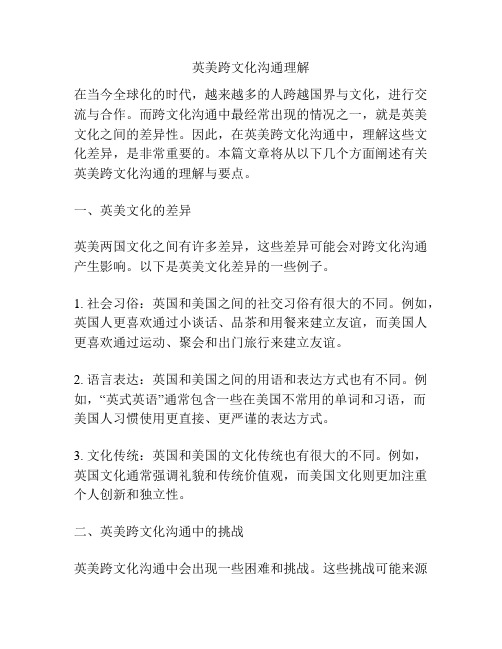
英美跨文化沟通理解在当今全球化的时代,越来越多的人跨越国界与文化,进行交流与合作。
而跨文化沟通中最经常出现的情况之一,就是英美文化之间的差异性。
因此,在英美跨文化沟通中,理解这些文化差异,是非常重要的。
本篇文章将从以下几个方面阐述有关英美跨文化沟通的理解与要点。
一、英美文化的差异英美两国文化之间有许多差异,这些差异可能会对跨文化沟通产生影响。
以下是英美文化差异的一些例子。
1. 社会习俗:英国和美国之间的社交习俗有很大的不同。
例如,英国人更喜欢通过小谈话、品茶和用餐来建立友谊,而美国人更喜欢通过运动、聚会和出门旅行来建立友谊。
2. 语言表达:英国和美国之间的用语和表达方式也有不同。
例如,“英式英语”通常包含一些在美国不常用的单词和习语,而美国人习惯使用更直接、更严谨的表达方式。
3. 文化传统:英国和美国的文化传统也有很大的不同。
例如,英国文化通常强调礼貌和传统价值观,而美国文化则更加注重个人创新和独立性。
二、英美跨文化沟通中的挑战英美跨文化沟通中会出现一些困难和挑战。
这些挑战可能来源于在文化习俗、语言表达,以及行为方式等方面的不同。
1. 文化习俗:英美跨文化沟通中,文化习惯和社交礼仪差异可能是非常大的障碍。
例如,英国人在交际场合喜欢使用一些封闭的语言表达方式,对于不熟悉的人可能会非常困惑。
2. 语言表达:不同的英美语言表达方式可能会在跨文化交流中产生误解和困难。
例如,“英式英语”中的一些单词和习语在美国非常不常用,可能会使得交流双方的理解起了偏差。
3. 行为方式:在英美跨文化交流中,行为方式和行为规范的不同可能会导致误解和冲突。
例如,在英国,长时间默默地等待在一个交际场合中的某个特定座位上是很常见的规矩;而在美国,这可能会被认为是不礼貌的行为。
三、英美跨文化体验的技巧在英美跨文化沟通中,有一些技巧和方法可以帮助我们更好地理解英美文化差异。
1. 学习语言表达:如果你是英语不是母语的人,那么学习更多关于英美语言表达方式的知识是非常重要的。
英美文化和习惯的了解和比较

英美文化和习惯的了解和比较英国和美国是两个拥有悠久历史和文化底蕴的国家,尽管它们的文化有共通之处,但在某些方面仍然存在一些差异。
本文将对英美文化和习惯进行了解和比较,并分析其背后的历史和社会背景。
一、饮食文化在饮食方面,英美文化存在一些显著差异。
英国饮食以早茶、炸鱼薯条、肉馅饼等为代表,注重传统和实用性。
而美国饮食则更加多元化,汉堡包、披萨、烤肉等快餐食品深受欢迎。
此外,美国人一日三餐的规律性相对较高,而英国人则更倾向于喝茶和吃点心来应对渴饿。
二、礼仪习惯英国和美国在礼仪方面也有一些区别。
英国人注重传统和绅士风度,相对保守一些。
在社交场合,英国人通常以握手作为打招呼的方式,而在较熟悉的情况下也可能亲吻对方的面颊。
另外,英国人在用餐时注重餐桌礼仪,例如使用刀叉的方式。
相比之下,美国人在社交场合更加随意,常常用拥抱和拥抱方式来打招呼。
此外,美国人在用餐时多用手,注重速度和便利性。
三、宗教信仰英国是基督教的发源地之一,英国人普遍信奉天主教和英国国教。
相比之下,美国信仰类型更加多元化,因为美国是一个移民国家,各种宗教信仰在这里融合并共存。
基督教、犹太教、伊斯兰教、佛教、印度教等宗教信仰都有一定的影响力。
四、体育文化体育文化在英美两国都有着重要地位。
英国的足球、板球和网球等运动在全球范围内都有很高的声誉。
足球作为英国的国球,几乎无处不在。
而美国人则更加热衷于美式橄榄球、篮球和棒球等运动,这些运动在美国的传播范围更广,吸引了无数的支持者。
五、节庆活动英国和美国都有丰富多彩的节庆活动。
英国的圣诞节、复活节等传统节庆活动受到广泛关注和庆祝。
美国则以独立日、感恩节和万圣节等节日而闻名。
此外,美国的超级碗和英国的皇家赛马会等体育赛事也成为两国人民热烈期待的节庆活动。
六、教育体系英美两国的教育体系存在一定差异。
英国的教育体系注重学生的综合素质培养,追求广博的知识面。
而美国的教育体系则更加注重学生的实践能力和创意才能的培养,鼓励学生拥有自己的独特见解和思考方式。
英美文化差异
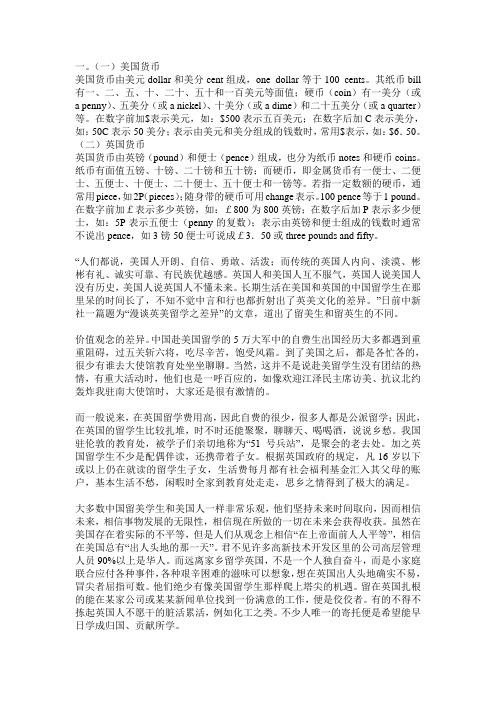
一。
(一)美国货币美国货币由美元dollar和美分cent组成,one dollar等于100 cents。
其纸币bill 有一、二、五、十、二十、五十和一百美元等面值;硬币(coin)有一美分(或a penny)、五美分(或a nickel)、十美分(或a dime)和二十五美分(或a quarter)等。
在数字前加$表示美元,如:$500表示五百美元;在数字后加C表示美分,如:50C表示50美分;表示由美元和美分组成的钱数时,常用$表示,如:$6.50。
(二)英国货币英国货币由英镑(pound)和便士(pence)组成,也分为纸币notes和硬币coins。
纸币有面值五镑、十镑、二十镑和五十镑;而硬币,即金属货币有一便士、二便士、五便士、十便士、二十便士、五十便士和一镑等。
若指一定数额的硬币,通常用piece,如2P(pieces);随身带的硬币可用change表示。
100 pence等于1 pound。
在数字前加£表示多少英镑,如:£800为800英镑;在数字后加P表示多少便士,如:5P表示五便士(penny的复数);表示由英镑和便士组成的钱数时通常不说出pence,如3镑50便士可说成£3.50或three pounds and fifty。
“人们都说,美国人开朗、自信、勇敢、活泼;而传统的英国人内向、淡漠、彬彬有礼、诚实可靠、有民族优越感。
英国人和美国人互不服气,英国人说美国人没有历史,美国人说英国人不懂未来。
长期生活在美国和英国的中国留学生在那里呆的时间长了,不知不觉中言和行也都折射出了英美文化的差异。
”日前中新社一篇题为“漫谈英美留学之差异”的文章,道出了留美生和留英生的不同。
价值观念的差异。
中国赴美国留学的5万大军中的自费生出国经历大多都遇到重重阻碍,过五关斩六将,吃尽辛苦,饱受风霜。
到了美国之后,都是各忙各的,很少有谁去大使馆教育处坐坐聊聊。
当然,这并不是说赴美留学生没有团结的热情,有重大活动时,他们也是一呼百应的,如像欢迎江泽民主席访美、抗议北约轰炸我驻南大使馆时,大家还是很有激情的。
英美文化差异中的习俗与礼仪
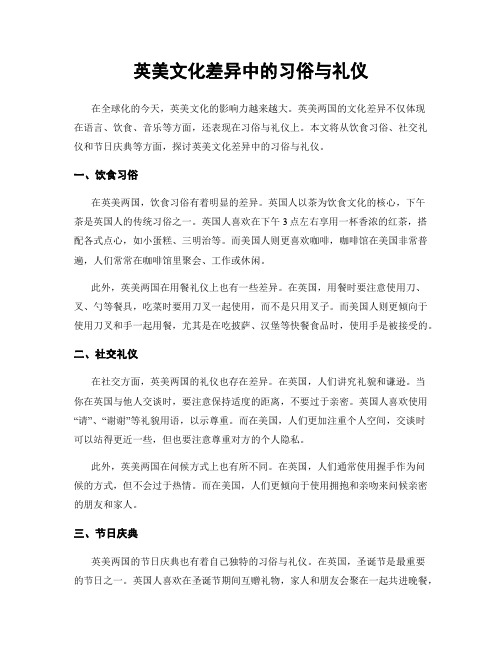
英美文化差异中的习俗与礼仪在全球化的今天,英美文化的影响力越来越大。
英美两国的文化差异不仅体现在语言、饮食、音乐等方面,还表现在习俗与礼仪上。
本文将从饮食习俗、社交礼仪和节日庆典等方面,探讨英美文化差异中的习俗与礼仪。
一、饮食习俗在英美两国,饮食习俗有着明显的差异。
英国人以茶为饮食文化的核心,下午茶是英国人的传统习俗之一。
英国人喜欢在下午3点左右享用一杯香浓的红茶,搭配各式点心,如小蛋糕、三明治等。
而美国人则更喜欢咖啡,咖啡馆在美国非常普遍,人们常常在咖啡馆里聚会、工作或休闲。
此外,英美两国在用餐礼仪上也有一些差异。
在英国,用餐时要注意使用刀、叉、勺等餐具,吃菜时要用刀叉一起使用,而不是只用叉子。
而美国人则更倾向于使用刀叉和手一起用餐,尤其是在吃披萨、汉堡等快餐食品时,使用手是被接受的。
二、社交礼仪在社交方面,英美两国的礼仪也存在差异。
在英国,人们讲究礼貌和谦逊。
当你在英国与他人交谈时,要注意保持适度的距离,不要过于亲密。
英国人喜欢使用“请”、“谢谢”等礼貌用语,以示尊重。
而在美国,人们更加注重个人空间,交谈时可以站得更近一些,但也要注意尊重对方的个人隐私。
此外,英美两国在问候方式上也有所不同。
在英国,人们通常使用握手作为问候的方式,但不会过于热情。
而在美国,人们更倾向于使用拥抱和亲吻来问候亲密的朋友和家人。
三、节日庆典英美两国的节日庆典也有着自己独特的习俗与礼仪。
在英国,圣诞节是最重要的节日之一。
英国人喜欢在圣诞节期间互赠礼物,家人和朋友会聚在一起共进晚餐,并且会有特别的圣诞布丁和圣诞蛋糕。
而在美国,感恩节是最重要的节日之一。
人们会在感恩节这一天与家人团聚,共进丰盛的晚餐,主菜通常是火鸡。
此外,英美两国的婚礼习俗也有所不同。
在英国,婚礼通常在教堂举行,新娘会穿着华丽的白色婚纱,新郎会穿着正式的西装。
而在美国,婚礼可以在教堂、花园、海滩等地举行,新人可以根据自己的喜好选择婚礼的形式和场地。
总结英美文化差异中的习俗与礼仪体现了两国人民的不同生活方式和价值观。
谈谈英国文化与美国文化的异同.doc
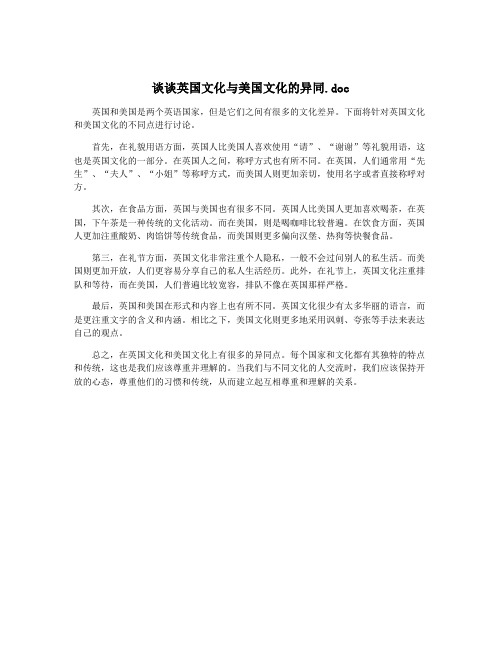
谈谈英国文化与美国文化的异同.doc
英国和美国是两个英语国家,但是它们之间有很多的文化差异。
下面将针对英国文化和美国文化的不同点进行讨论。
首先,在礼貌用语方面,英国人比美国人喜欢使用“请”、“谢谢”等礼貌用语,这也是英国文化的一部分。
在英国人之间,称呼方式也有所不同。
在英国,人们通常用“先生”、“夫人”、“小姐”等称呼方式,而美国人则更加亲切,使用名字或者直接称呼对方。
其次,在食品方面,英国与美国也有很多不同。
英国人比美国人更加喜欢喝茶,在英国,下午茶是一种传统的文化活动。
而在美国,则是喝咖啡比较普遍。
在饮食方面,英国人更加注重酸奶、肉馅饼等传统食品,而美国则更多偏向汉堡、热狗等快餐食品。
第三,在礼节方面,英国文化非常注重个人隐私,一般不会过问别人的私生活。
而美国则更加开放,人们更容易分享自己的私人生活经历。
此外,在礼节上,英国文化注重排队和等待,而在美国,人们普遍比较宽容,排队不像在英国那样严格。
最后,英国和美国在形式和内容上也有所不同。
英国文化很少有太多华丽的语言,而是更注重文字的含义和内涵。
相比之下,美国文化则更多地采用讽刺、夸张等手法来表达自己的观点。
总之,在英国文化和美国文化上有很多的异同点。
每个国家和文化都有其独特的特点和传统,这也是我们应该尊重并理解的。
当我们与不同文化的人交流时,我们应该保持开放的心态,尊重他们的习惯和传统,从而建立起互相尊重和理解的关系。
英美文化的差异与区别有哪些
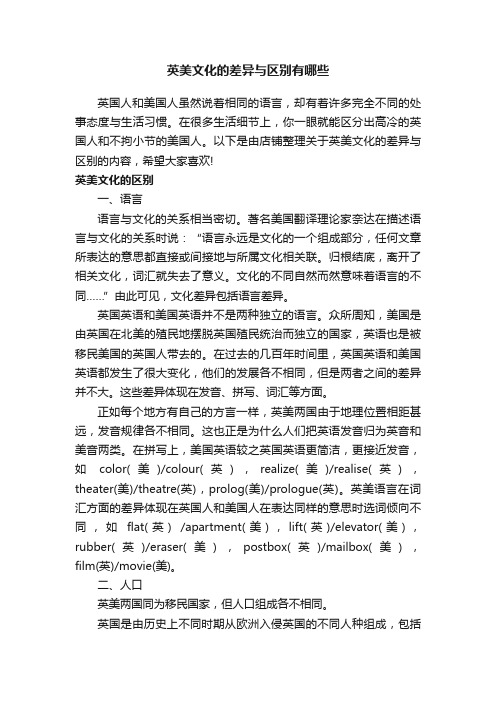
英美文化的差异与区别有哪些英国人和美国人虽然说着相同的语言,却有着许多完全不同的处事态度与生活习惯。
在很多生活细节上,你一眼就能区分出高冷的英国人和不拘小节的美国人。
以下是由店铺整理关于英美文化的差异与区别的内容,希望大家喜欢!英美文化的区别一、语言语言与文化的关系相当密切。
著名美国翻译理论家奈达在描述语言与文化的关系时说:“语言永远是文化的一个组成部分,任何文章所表达的意思都直接或间接地与所属文化相关联。
归根结底,离开了相关文化,词汇就失去了意义。
文化的不同自然而然意味着语言的不同……”由此可见,文化差异包括语言差异。
英国英语和美国英语并不是两种独立的语言。
众所周知,美国是由英国在北美的殖民地摆脱英国殖民统治而独立的国家,英语也是被移民美国的英国人带去的。
在过去的几百年时间里,英国英语和美国英语都发生了很大变化,他们的发展各不相同,但是两者之间的差异并不大。
这些差异体现在发音、拼写、词汇等方面。
正如每个地方有自己的方言一样,英美两国由于地理位置相距甚远,发音规律各不相同。
这也正是为什么人们把英语发音归为英音和美音两类。
在拼写上,美国英语较之英国英语更简洁,更接近发音,如color(美)/colour(英),realize(美)/realise(英),theater(美)/theatre(英),prolog(美)/prologue(英)。
英美语言在词汇方面的差异体现在英国人和美国人在表达同样的意思时选词倾向不同,如flat(英) /apartment(美),lift(英)/elevator(美),rubber(英)/eraser(美),postbox(英)/mailbox(美),film(英)/movie(美)。
二、人口英美两国同为移民国家,但人口组成各不相同。
英国是由历史上不同时期从欧洲入侵英国的不同人种组成,包括伊比利亚人(Iberians)、凯尔特人(Celts)、古罗马人(Romans)、盎格鲁——撒克逊人(Anglo—Saxons)、北欧人(Danes)、诺曼人(Normans)。
英国和美国的文化比较

英国和美国的文化比较 Company Document number:WUUT-WUUY-WBBGB-BWYTT-1982GT英国和美国的文化比较摘要人们都说,美国人开朗、自信、勇敢、活泼;而传统的英国人内向、淡漠、彬彬有礼、诚实可靠、有民族优越感。
英国人和美国人互不服气,英国人说美国人没有历史,美国人说英国人不懂未来。
他们语言里不知不觉折射出了英美文化的差异。
本文从政治及法律、语言、历史、地理、宗教等几个方面讨论英美之间的文化差异。
一、英美政治及法律体系的差异英国创立了第一套西方资本主义政治制度体系,一向被誉为西方政治制度的源泉与典范;美国则在吸收、借鉴英国政治制度的基础上,结合本国国情加以调整,使本国的政治制度体系趋于完善。
英国作为欧洲民族国家是在君主制的基础上形成的,当时利用公法来限制君主的权力,并依据公法设立政府机构,公法比较发达,因此一般把政府机构和宪法看作政治制度的核心;与具有明确国家观念的英国不同,美国的公法主要是用于处理政府与个人的关系,并由司法机构进行法律监督,因此有时把政治制度等同于政府形式。
英美两国政治制度具有相同的理论基础:“天赋人权”学说和“三权分立”原则;政治制度的具体内容都包括议会制度、选举制度、司法制度、政府制度、公务员制度和政党制度等;都标榜“人民民主”,以代议制为民主的主要形式;政权体制都实行分权制衡和“法治”原则的特点。
而最根本的是作为资本主义国家政治制度的两个典型代表,英美两国在维护资产阶级利益、维护资主义私有制度、实行资产阶级专政等方面具有相同的本质。
但在具体政治制度层面两国又各自呈现不同的特点。
英国宪法既不能以一道或数道公文列举,也不能以过去和现在的时间来严格区别,它缺乏谨严明确的内容,也缺乏首尾完整的体系。
与美国宪法有所区别。
英宪的所有规则按照有无实效为标准分为英宪的法律和英宪的典则两部分。
前者包括英宪的法理、法规,后者包括典俗、成训、惯例等。
英国宪法就是以法律和典则两类规则构成的体系,按照这一体系的规则,英格兰的主权得以合法运用并分配于政府和人民之间。
英美文化差异

英美文化差异在探讨英国和美国的文化差异时,我们可以从多个角度进行比较和分析。
这两个国家虽然都使用英语作为官方语言,并且在历史上有着深厚的联系,但它们各自独特的历史背景、社会结构、价值观念以及日常生活方式造就了显著的文化特色。
教育体系英国的教育体系与美国存在明显不同。
英国拥有严格的分级制度,学生在11岁时参加全国性考试(Common Entrance Exam),根据成绩被分配到不同的中学,如文法学校、综合学校和技术学校。
而美国的教育体系更加灵活,提供多样化的高中课程选择,并强调全面发展。
饮食文化在饮食方面,英国传统食物以其简单、实在著称,如炸鱼薯条、全套英式早餐等。
而美国的饮食文化则更为多元,融合了各种国际风味,快餐文化在美国尤为发达,例如汉堡、热狗和比萨饼等。
礼仪习惯英国人以其保守、礼貌著称,在日常生活中非常注重排队等候和“请”、“谢谢”的使用。
美国人则相对随和,社交场合中握手较为常见,而在非正式场合拥抱和亲吻作为问候也不罕见。
工作与休闲在工作文化方面,英国人通常工作时间固定,假期安排也比较规律。
相比之下,美国的工作时间可能更加灵活,加班文化在某些行业也更为普遍。
至于休闲活动,英国人喜欢下午茶、园艺和观看足球等体育活动,而美国人可能更倾向于户外运动、观看美式足球或篮球比赛。
语言使用尽管两国都以英语为主要语言,但在词汇使用上有所不同。
英国人使用的一些词汇在美国可能有不同的含义或根本不被使用,反之亦然。
例如,英国人用“aubergine”表示茄子,而美国人称之为“eggplant”。
节日庆祝在节日庆祝方面,两国虽有共同的重要节日如圣诞节和复活节,但庆祝方式各有特色。
美国的感恩节在英国并不庆祝,而英国的盖伊·福克斯之夜(Bonfire Night)在美国也较少见。
总之,英美文化差异体现在生活的方方面面,从教育到饮食,从礼仪到工作休闲,再到语言和节日庆祝。
了解这些差异不仅有助于跨文化交流,也能让我们更好地理解各自的社会和文化背景。
英美文化异同
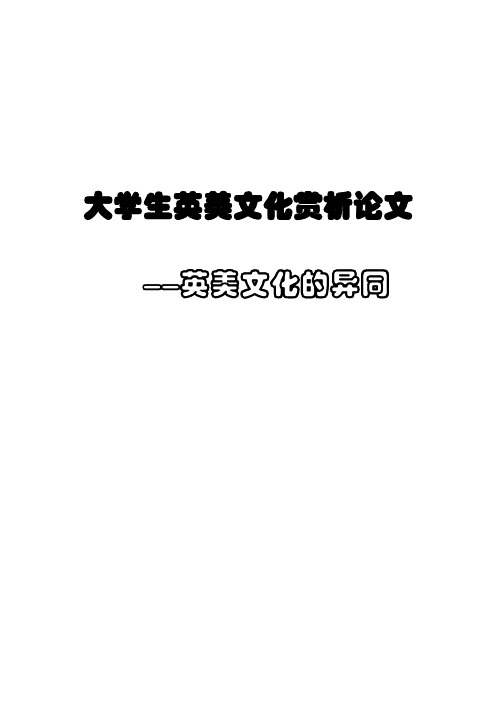
大学生英美文化赏析论文——英美文化的异同摘要人们都说,美国人开朗、自信、勇敢、活泼;而传统的英国人内向、淡漠、彬彬有礼、诚实可靠、有民族优越感。
英国人和美国人互不服气,英国人说美国人没有历史,美国人说英国人不懂未来。
长期生活在美国和英国的中国留学生在那里呆的时间长了,不知不觉中言和行也都折射出了英美文化的差异。
政体、教育、宗教和法律体系等几个方面讨论英美之间的文化差异。
一、英美政党制度方面的差异英国是现代政党政治的发源地,是实行两党制的典型国家。
主宰英国政坛100多年以本上是两个重要政党,先是托利党和辉格党,继而是保守党和自由党,后来为保守党和工党。
英国政党制度具有以下特点:⑴同议会内阁制相结合,执政党和反对党在形式上界限分明。
英国实行的是议会内阁制,有上下两议院。
上议院议员不由选举产生,而是由贵族世袭或国王任命,与政党无关。
下议院由选举产生。
两大政党靠竞选争夺下议院议席,有获得多数席位的政党组阁,该党的领袖担任内阁首相,掌握政府权力。
组阁的政党便是执政党。
执政党既掌握内阁的实权,又掌握下议院的实权。
选举中未获得多数的政党便是在野党或反对党。
反对党负有监督政府的责任,可以组成有各部大臣的“影子内阁”。
执政党和反对党在形式上界限分明。
⑵两大政党均采取集中制。
主要表现在:无论中央或地方,每个政党都有健全的组织;有严格的组织纪律;特别是党内对议会投票有严格的规定。
在议会的重要投票中,各政党都要求其党员作为一个集团,按照领导人的意图投票。
否则,会受到严厉处罚。
美国也是实行两党制的典型国家,美国政党制度具有以下特点:⑴同民主共和体相联系,党的主要活动是进行总统竞选。
美国是总统制国家。
美国政党的主要活动是进行总统竞选。
竞选获胜的政党为执政党,失败者为反对党。
美国国会议员虽然也是有选举产生,但两大政党在议会中席位的多少与执政地位无关。
在美国,一个政党只要在总统竞选中获胜,即使它在国会选举中失败,也不会影响它的执政地位。
谈谈英国文化与美国文化的异同

谈谈英国文化与美国文化的异同英国和美国,这两个在世界舞台上具有重要影响力的国家,各自拥有独特而鲜明的文化。
尽管它们之间存在着千丝万缕的联系,但在许多方面又展现出显著的差异。
从历史的角度来看,英国拥有悠久而丰富的历史传承。
作为曾经的“日不落帝国”,其文化底蕴深厚,受到罗马、诺曼等多种外来文化的影响。
相比之下,美国是一个相对年轻的国家,其历史始于欧洲移民的开拓,融合了来自世界各地的文化元素。
语言是文化的重要载体。
英式英语和美式英语在发音、拼写和词汇使用上都有一定的差别。
比如,在发音方面,英式英语较为严谨和正统,元音发音清晰准确;而美式英语则更加随意和流畅,发音较为平缓。
在拼写方面,“colour”(英式)和“color”(美式)、“centre”(英式)和“center”(美式)等单词的拼写不同。
词汇方面,“lorry”(英式,意为卡车)在美式英语中是“truck”,“flat”(英式,意为公寓)在美式英语中是“apartment”。
饮食文化也是两者的一大区别。
英国传统美食有炸鱼薯条、约克郡布丁、康沃尔馅饼等。
英国的下午茶文化更是闻名于世,人们会在下午享用精致的点心和茶。
而美国则是一个美食的大熔炉,融合了世界各地的美食特色,如汉堡、热狗、披萨等快餐食品成为了美国饮食文化的代表。
此外,美国南部的烤肉、新英格兰地区的海鲜等也各具特色。
在教育方面,英国的教育体系历史悠久,注重学术传统和精英教育。
例如,牛津大学和剑桥大学等世界知名学府,以其严格的学术要求和深厚的学术氛围而著称。
美国的教育则更加强调综合素质的培养和个性化发展,鼓励学生积极参与课外活动和社会实践。
美国拥有众多顶尖的大学,如哈佛大学、斯坦福大学等,其教育理念注重创新和实践能力的培养。
在社交礼仪方面,英国相对更加传统和保守。
在正式场合,人们的着装和举止都有严格的规范。
比如,在参加晚宴时,男士通常要穿西装打领结,女士要着晚礼服。
而美国的社交礼仪则相对较为随意和自由,更注重个人的舒适和表达。
英国与美国的文化差异

英国与美国的文化差异英美文化的差异表现在很多方面:一、英美语言差异尽管英美两个国家都是讲英语的,但是美国英语和英国英语是不相同的。
英国人与美国人虽然说的都叫英语,但这两种英语的差异还是很大的,学英语的人都知道,英语中有英式发音和美式发音两种。
英国人的英语,相对而言,发音比较清楚,连读的部分较少,一般听起来相对比较字正腔圆;而美国人说英语,则秉持这能省则省,能连就连的原则,因此,对于把英语作为第二语言的人来说,听英国人的发音相比较下会舒服得多,而如果要习惯美音,恐怕只有在美国生活过的人才真正做到了。
另外,两国在字词上的用法也有很多的不同二、英美生活习俗差异英国人和美国人在自己日常生活习俗上也有区别。
从服饰上看,英国2人非常讲究衣着,讲究绅士风度,西装革履,皮鞋锃亮。
美国人则比较随便,想穿什么就是什么,以自己舒适为主,不会去介意别人的评价,别人也不会去评价。
有的英国女士接待黄皮肤朋友时,专门涂抹上黄色面霜,以表示对朋友的亲近和尊重。
美国人可方便多了,近几年,美国流行大花裤衩,校内校外,老老少少,都少不了它的影子。
但这也并不是说,他们到处随意,在一些场合,他们也是西装革履,文质彬彬,很有些“绅士”的派头。
但如果一看到没有旁人,这些“绅士”就原形毕露,鞋也脱了,领带也松了,扣子也解了,脚也搭起来了。
从饮食上看两国的美食都像英语一样,是一个大杂烩,广泛吸收了世界各地不同文化的影响。
众所周知,英国是一个聚集了诸多绅士淑女的地方,而英国的饮食,也处处散发着英国上流社会应有的高贵气质,从选材到烹饪,再到餐桌上的一言一行,英国人无不将细致发挥到了极致。
特别在餐桌礼仪上,不能在餐桌上说话,不能有餐具敲击的声音,刀叉的握法……几乎所有我们所了解的法式西餐的规则都被英国人所遵守而同样是吃饭,到了美国人身上,则就显得随意了许多。
美国式饮食不讲究精细,追求快捷方便,也不奢华,比较大众化。
一日三餐都比较随便。
老美的最爱便是所谓的垃圾食品。
- 1、下载文档前请自行甄别文档内容的完整性,平台不提供额外的编辑、内容补充、找答案等附加服务。
- 2、"仅部分预览"的文档,不可在线预览部分如存在完整性等问题,可反馈申请退款(可完整预览的文档不适用该条件!)。
- 3、如文档侵犯您的权益,请联系客服反馈,我们会尽快为您处理(人工客服工作时间:9:00-18:30)。
Cultural differences on politeness between western and Chinese can be found in many aspects of daily communication, including addressing, greeting and parting,compliments, apologies, thanks, etc. In the following, we will look at some cultural different between China and western.1.Greeting and PartingWhen people meet acquaintances or friends, people usually greet each other. The purpose of greeting is to establish or maintain social contact. So formulaic expressions are often used, but such formulaic expressions often causes conflict because of the great cultural differences between Chinese and native English speakers. In English, people often employ the following expressions to greet each other “Good morning/evening/afternoon. “Fine day, isn’t it? ”How is everything going?” Have you eaten yet?” What are you going to do?” Where have you been?”etc. Westerners treat them as real question. While in Chinese, we always say “你吃了吗?”“你上哪里去?”“你干什么去?”to show our consideration. Parting may be divided into two steps. Before the final prating, there is usual a leave-taking. Western and Chinese cultures have diverse ways to deal with leave-takings. Firstly, in English society, during the closing phase of an encounter, from ”I” perspective, reasons for terminating the encounter are presented in mitigatory comments. Typical comments are associated with expressions of apology,such as “I” am afraid I must be off, I have to relieve the ba by-sitter” etc.Western people believe that to be willing to visit and converse with someone is to have respect for him.; to terminate the visiting is not of one’s own free will, but because of some other arrangements, therefore they always try to make their leaving sound reluctant by finding some reasons and apologize for it to make the leaving acceptable for both parties. English speakers often signal several times before leaving. “Well, it’s been nice to see you again. I do enjoy our talk and the lovely dinner, but I must be going soon”. Thank you very much forasking me over. I hope we’ll be able to get together again before long…” Consolidation in a wider range of common acquaintances also occurs, in expressions such as “Say hello to Jack for me” or “Remember me to John”. In Chinese society, during the closing phase of and encounter, usually, from a “you ”perspective, reasons for ending the encounter are set forth in mitigatory expressions. Such expressions include“你挺忙的,我就不多打扰了。
”“你一定累了,早点休息吧,我要告辞了。
”, etc. With these words, they may stand up from their seats. Chinese leave-taking is very short and quick. Western people think it so abrupt that they have not prepare for it. While moving to the door, Chinese employ expressions of apology like“对不起没,打扰了。
”“对不起,占用你不少时间。
”It should be noted that these expressions employed by Chinese guests to show concern for their hosts can only be appropriate for business visits in the English environment2..AddressingBoth western and Chinese people have two kinds of personal names---a surname anda given name. But the order and the use of these names in the two languages are somewhat different. In Chinese, the surname comes first and then the given name. And people like add“小”before their family name. Such as“小王”、“小郑”、“小李”、“小徐”and so on.. While westerners names are written and spoken with the given name first and the family name last. So John Smith's family name is Smith, not John. In a formal setting, address men as "Mister" (abbreviated as "Mr."), married women as "Misses" (abbreviated as "Mrs."), and unmarried women as "Miss" (abbreviated as "Ms."). These days many women prefer to be addressed using the abbreviations "Ms." or "M.", pronounced "miz". If the person has an M.D. or Ph.D., they will often be addressed as "Doctor" (abbreviated as "Dr."). Faculty are addressed as "Professor" (abbreviated as "Prof.").In an informal situation,westerners will introduce each other by first name, without titles, and occasionally by just the last name. If you are introduced to somebody by first name, you can address him or her by first name the next time you meet. The only exception would be for someone who holds an important position, such as the university president or provost. Unless they tell you otherwise, faculty should be addressedusing their title and last name (e.g., "Professor Smith"). When in doubt, use the formal manner of address, since it is better to err on the side of formality.It is also appropriate to ask how they prefer to be addressed. Children should always address adults in the formal fashion, using their title and last name.Another difference is about the form of addressing. From the viewpoint of sociolinguistics, formsof addressing can serve as an indication of the relationship of power and solidarity in the society. In calling their superiors or elders, the Chinese are accustomed to the nonreciprocal or asymmetrical addressing, in other words. They use “title +surname” to address their superior or elders rather than call them surnames, while the superior or eld ers call the addressers their names. The Chinese tend to abide by the polite principle of depreciating oneself and respecting others to show appropriate respects towards the persons being addressed, otherwise, the addresser may be considered as ill mannered, ill educated or rude. But in English speaking countries, people have a tendency to follow the reciprocal or symmetrical addressing. Although they are different in age and status, they can call the other directly, namely, their names, even first names except when they call the doctors, not arousing offence between them, but demonstrating the sense of intimacy and the conception of” Everyone is created equal”. Chinese people feel unnatural addressing a westerner by his given name, feeling that it indicates too close a relationship, and westerners, on the other hand,may feel that if a Chinese insists on using his surname, it indicates an unwillingness to be friendly and maintains a gap between them. So the use of forms like” Miss Mary” or “Mr. Smith ” may be a Chinese forms of compromise. With Miss Mary, the use of the given name indicates friendliness, but the addition of the title indicates the respect they feel they ought to show. And with Smith, the lack of a title indicates friendliness, but the use of the surname prevents if sounding too intimate. However, both addressing used by the Chinese sound very strange and uncomfortable to the westerner.pliments and ResponseTo compliment is to praise the addressee’s virtues, ability, behavior, appearance, clothing, personality and belongs. Appropriate compliments can serve as effective supplementary means in inter-personal communication. Western and Chinese culture are at polar opposites about compliment. An western hostess, if she is complimented for her cooking skill, is likely to say,” Oh, I am so glad that you liked it. I cook it especially for you.” Not so is a Chinese hostess, who will instead apologize for giving you “Nothing”. They will say“随便作几个菜,不好吃。
